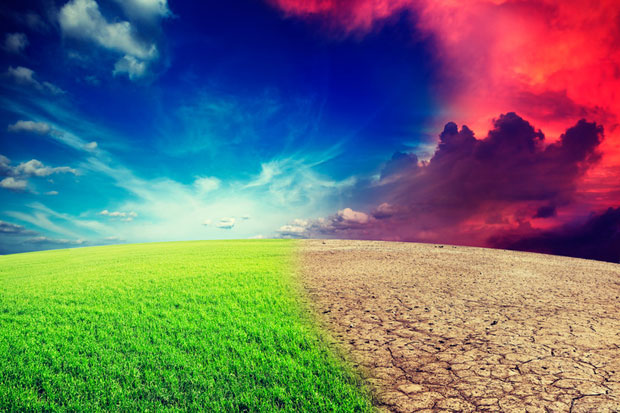A new report released yesterday by the Australian National University has highlighted the predicted escalation in cost if Australia fails to take strong action on climate change, and raised the spectre of punishment for inaction on the international stage.
The report argues that “Australia’s interest is in strong global action” but also suggests punitive measures such as ‘border tax adjustments’ and increased insurance premiums from other countries and foreign institutions could arise if emissions are not cut deeply and quickly.
In preparing the report, Professor Frank Jotzo synthesised existing studies on the economic costs of delayed climate action and the risk Australia could expose itself to by continuing to develop and support high-carbon industries.
The report contends that if action is delayed the globally agreed goal of limiting temperature rises to below two degrees above pre-industrial levels will effectively be out of reach within 15 years and the cost of reducing emissions could be up to 82 per cent greater.
Another study cited in the report, produced by the International Energy Agency, suggests that for every $1 of investment in climate action before 2020, $4.30 would need to be spent after 2020.
In this context, it is noted that 90 per cent of coal, 50 per cent of gas and 40 per cent of Australian oil are ‘unburnable’ if the world is to stick to the two degree limit agreed by nearly 200 nations.
Despite the increasing dominance of such figures that seek to lay down a ‘carbon budget’, Australian governments at both state and federal levels, have continued to rapidly expand the nation’s coal export industry.
In fact, the federal government is considering extending subsidies to coal mines proposed for Queensland’s Galilee Basin, which would collectively produce more carbon emissions than entire nations like the UK, Italy, and South Africa precisely because they may otherwise be uneconomic.
Our domestic emissions are also incompatible with effective climate action. The report cites a Climate Change Authority study which ranks Australia as the 15th highest emitting nation, despite our small population.
There has also been widespread condemnation of the Abbott government’s ‘Direct Action’ climate policy which pays polluters to abate their emissions, and experts say we’re unlikely to meet even our modest 2020 target of a five per cent reduction of 2000-level emissions.
The government will announce its post-2020 policy in June, ahead of the 21st conference of the parties in Paris later this year.

“Ongoing progressive policy is the key here,” Jotzo told New Matilda.
“Paris is shaping up very positively indeed because we’ve got both developed and developing countries coming out with their own national pledges for reductions.”
He said that recent developments which have seen China, the United States and the European Union unveil ambitious targets “puts pressure on everyone else to do likewise”.
Interestingly, the report suggests that this pressure could come in forms other than global tut-tutting and angry letter writing.
“Perceptions that Australia is not pulling its weight could lead to other countries applying ‘border tax adjustments,” the report said.
“Carbon border tax adjustments, such as import tariffs linked to the amount of greenhouse gas emissions incurred in production, are one possible measure [and]such measures have already been discussed by the EU and US.
“It’s also for a set of reasons that are much closer to the short term national interest,” Jotzo said.
“In China, that’s air pollution, it’s also concerned about energy security… they don’t want to be hostage to international market conditions.”
Jotzo said that at a recent conference he attended in Shanghai, a senior researcher “remarked in a forum that China was investigating the possibility of carbon tariffs to be applied to imports from countries that do not have a meaningful climate change emissions policy”.
As part of a United Nations process, China, along with a range of other influential nations, recently asked Australia to “please clarify the fairness” of indications it would adopt a 15-25 per cent target based on the level of international action.
The report also canvases the possibility that shifts in international consumer sentiment and overseas banks and investors applying higher risk premiums to Australian fossil fuel intensive projects.
The economic, as well as environmental and social, case for limiting temperature rises to two degrees is now “a widely and in fact strongly held view by many including the top global economists working on this”, Jotzo said.
Asked whether he thought allies like the US might sanction Australia for climate inaction, Jotzo said it was unlikely to come in the form of direct action.
“It’s easy to see the US being part of an international pact that says there may be border tax adjustments in order to account for stark difference in domestic policies affecting carbon intensive industries, and that is something that Australia could be caught up in,” he said.
“That would not be the US waving a big stick at Australia, as China might well, but it could be the US sort of supporting collective international action, supporting an international understanding.”
The joint ANU/WWF report is a companion to an earlier report which argued Australia could reach net-zero emissions by 2050 without depressing economic growth.
With Australia set to declare its contribution to the approaching global climate pact in June, it won’t be long until the public sees how far, and how quickly, the Abbott government will go down that road.
Donate To New Matilda
New Matilda is a small, independent media outlet. We survive through reader contributions, and never losing a lawsuit. If you got something from this article, giving something back helps us to continue speaking truth to power. Every little bit counts.




